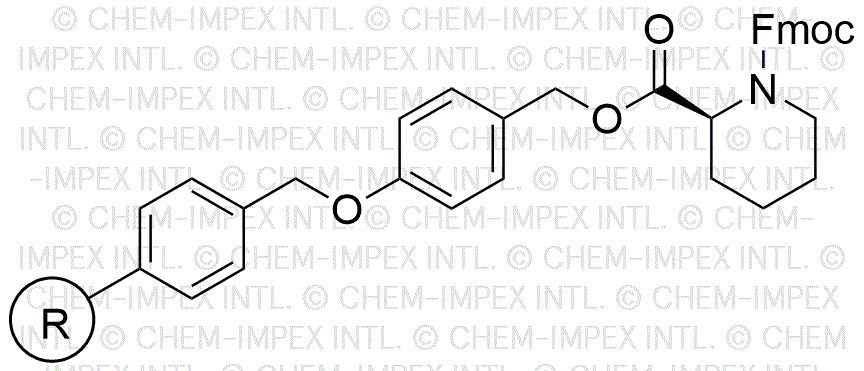Fmoc-L-pipecolic acid 4-alkoxybenzyl alcohol resin is widely utilized in research focused on:
- Peptide Synthesis: This resin is crucial for solid-phase peptide synthesis, allowing researchers to efficiently create peptides with high purity and yield.
- Drug Development: It serves as a building block in the synthesis of bioactive compounds, aiding pharmaceutical researchers in developing new drugs.
- Bioconjugation: The resin can be used to attach various biomolecules, enhancing the functionality of therapeutic agents in targeted drug delivery systems.
- Material Science: It plays a role in creating novel materials with specific properties, useful in developing sensors or drug delivery systems.
- Research in Neuroscience: The compound is valuable for synthesizing neuroactive peptides, contributing to studies on neurological disorders and potential treatments.
Información general
Propiedades
Seguridad y normativas
Aplicaciones
Fmoc-L-pipecolic acid 4-alkoxybenzyl alcohol resin is widely utilized in research focused on:
- Peptide Synthesis: This resin is crucial for solid-phase peptide synthesis, allowing researchers to efficiently create peptides with high purity and yield.
- Drug Development: It serves as a building block in the synthesis of bioactive compounds, aiding pharmaceutical researchers in developing new drugs.
- Bioconjugation: The resin can be used to attach various biomolecules, enhancing the functionality of therapeutic agents in targeted drug delivery systems.
- Material Science: It plays a role in creating novel materials with specific properties, useful in developing sensors or drug delivery systems.
- Research in Neuroscience: The compound is valuable for synthesizing neuroactive peptides, contributing to studies on neurological disorders and potential treatments.
Documentos
Hojas de datos de seguridad (HDS)
La SDS proporciona información de seguridad completa sobre la manipulación, el almacenamiento y la eliminación del producto.
Especificación del producto (PS)
La PS proporciona un desglose completo de las propiedades del producto, incluida la composición química, el estado físico, la pureza y los requisitos de almacenamiento. También detalla los rangos de calidad aceptables y las aplicaciones previstas del producto.
Certificados de análisis (COA)
Busque certificados de análisis (COA) ingresando el número de lote del producto. Los números de lote y de partida se pueden encontrar en la etiqueta de un producto después de las palabras "Lote" o "Lote".
Número de catálogo
Número de lote/lote
Certificados de origen (COO)
Este certificado de origen confirma el país en el que se fabricó el producto y también detalla los materiales y componentes utilizados en él y si se deriva de fuentes naturales, sintéticas u otras fuentes específicas. Este certificado puede ser necesario para cumplir con las normativas aduaneras, comerciales y regulatorias.
Número de catálogo
Número de lote/lote
Hojas de datos de seguridad (HDS)
La SDS proporciona información de seguridad completa sobre la manipulación, el almacenamiento y la eliminación del producto.
DownloadEspecificación del producto (PS)
La PS proporciona un desglose completo de las propiedades del producto, incluida la composición química, el estado físico, la pureza y los requisitos de almacenamiento. También detalla los rangos de calidad aceptables y las aplicaciones previstas del producto.
DownloadCertificados de análisis (COA)
Busque certificados de análisis (COA) ingresando el número de lote del producto. Los números de lote y de partida se pueden encontrar en la etiqueta de un producto después de las palabras "Lote" o "Lote".
Número de catálogo
Número de lote/lote
Certificados de origen (COO)
Este certificado de origen confirma el país en el que se fabricó el producto y también detalla los materiales y componentes utilizados en él y si se deriva de fuentes naturales, sintéticas u otras fuentes específicas. Este certificado puede ser necesario para cumplir con las normativas aduaneras, comerciales y regulatorias.

